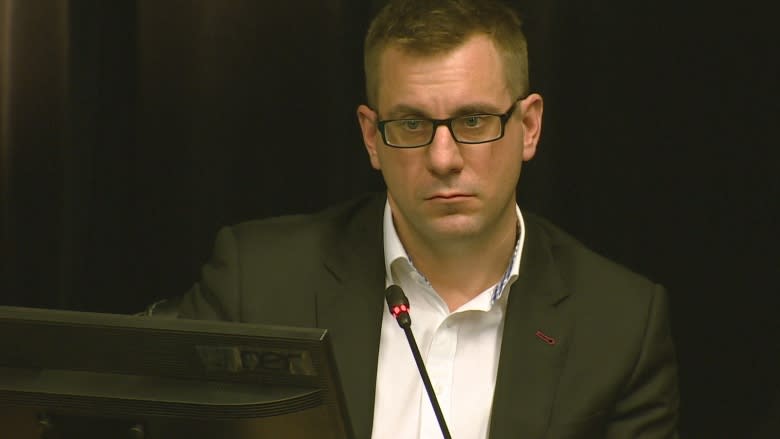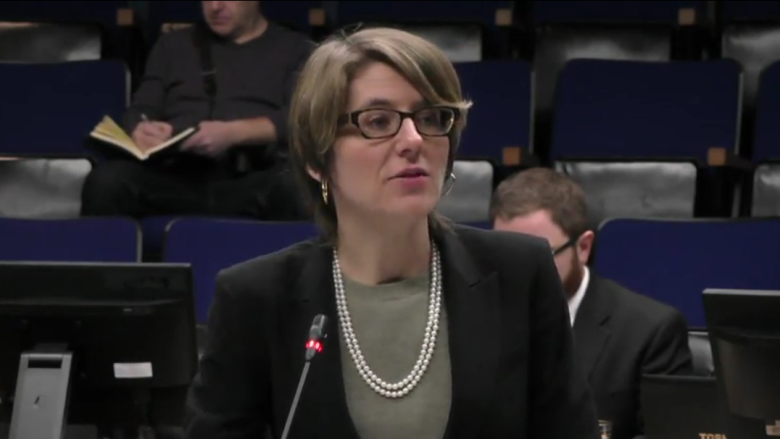Mistakes in RCMP timeline of Don Dunphy shooting death
Two errors in the timeline in the RCMP's report on Don Dunphy's shooting were highlighted Thursday at the inquiry into the shooting, mistakes that throw the times of many of the events that day into question.
Joe Smyth, a Royal Newfoundland Constabulary constable, fatally shot Dunphy on April 5, 2015. Smyth was at Dunphy's Mitchells Brook home to speak with him about tweets he wrote criticizing provincial politicians.
Smyth, who was then a member of the premier's protective services unit, has testified that he fired his pistol in self defence after Dunphy pointed a rifle at him.
Timeline errors
The RCMP's timeline says Smyth tried to phone Dunphy's friend Colin Dinn before going to Dunphy's home.
We now know from previous testimony at the inquiry, that those calls were made to Dunphy's phone, not Dinn's, calls that didn't go through because of poor cell service.
The second timeline error is that police said the calls were made after Smyth visited Dunphy's brother and sister-in-law, Dick and Debbie Dunphy.
We now know those calls were made before that visit and a lawyer for the inquiry says that changes other parts of the timeline, including what happened inside Dunphy's home.
While there is a time-stamped record of when Smyth called the RNC communications centre to report the shooting, Kate O'Brien said other times may not be reliable.
"It means the time between shooting and calling RCMP, (13 minutes and 15 seconds), we can no longer rely on that," said O'Brien. "Because we can't rely on timeline account of when Smyth drew his gun."
These times will likely be significant when lawyers for Smyth and Meghan Dunphy give their final summations to the inquiry.
Any arguments suggesting evidence was tampered with or denying that happened will likely make references to the timeline of events on the day of the shooting.
RCMP criminal analyst Wanda Richards created the timeline in the police report, using information given to her by other officers.
Testifying at the inquiry on Thursday, she agreed there are errors in the timeline. She said that she has not been asked to revise the times.
Smyth's supervisor testifies
RNC acting Inspector Joe Gullage says "he shook his head" when he read the April 10 email Smyth sent to members of the RNC and some members of the RCMP.
The email expressed no regret but wished some other kind of earlier intervention had been possible.
"Although I cannot regret my actions last Sunday, I unequivocally wish I could have visited Mr. Dunphy at a point in his life where another level of intervention may have been possible," wrote Smyth.
Testifying Thursday, Gullage said he thought the email should not have been sent because Smyth was under investigation at the time and therefore shouldn't have been speaking with colleagues about the incident.
When Smyth testified, he was critical of the RNC saying it should have done more to support him publicly after the shooting.
Gullage said he agreed with some of what Smyth said.
"More could have been done to explain police use-of-force training," he said.
Responding to questions from Meghan Dunphy's lawyer, Bob Simmons, about the decisions Smyth made leading up to the shooting, Gullage supported Smyth.
Simmonds asked: "Shouldn't Smyth have phoned and made an appointment first? There's no evidence he would have had a negative reaction?"
Gullage responded: "I can't really answer. Each officer has a different style of risk assessment. There are all kinds of things that could have been done but I don't question Smyth's decision. Hindsight is a wonderful thing. We would done a lot have things differently."
Answering questions from Smyth's lawyer, Jerome Kennedy, about Smyth's decision to visit Mitchells Brook alone on Easter Sunday, Gullage was supportive.
"I have absolutely no concerns with what Smyth did," said Gullage.
The RCMP investigated the shooting and concluded that Smyth used appropriate force.





